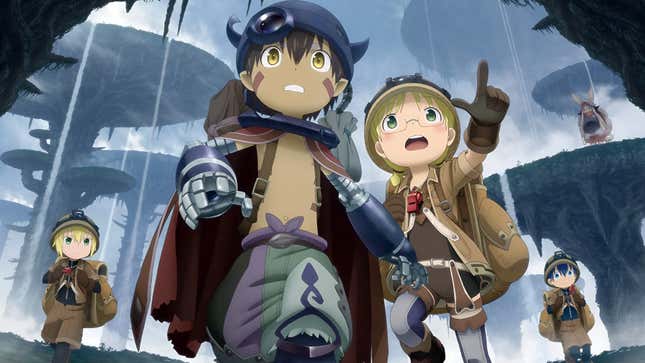
Anime adaptations of video games are entering a renaissance of sorts with the critical success of Netflix’s Cyberpunk: Edgerunners, Arcane, and Castlevania. Unfortunately, if we flip the process around, the same can’t be said for the latest video game adaptation of the dark fantasy anime Made in Abyss, which leaves a lot to be desired.
Made in Abyss: Binary Star Falling into Darkness, developed by Chime Corporation, is a 3D action-RPG based on the anime. You play as the anime’s heroine Riko, the daughter of a famous cave diver. After meeting a mysterious robot named Reg, whom she assumes was sent up from the abyss’ depths by her mother, the pair embark on a harrowing journey to the bottom of the abyss where they encounter ever more dangerous monsters and plant life. The game came out on PlayStation 4, Nintendo Switch, and Steam on September 2.
Although Binary Star Falling into Darkness was overseen by franchise creator Akihito Tsukushi and the original Japanese and English anime voice casts recorded new material for the game, I walked away from it feeling as hollow as the pit Riko and Reg plunged into. Made in Abyss is one of the most visually impressive and enthralling adventure anime, but this game is a pale imitation in almost every regard. And worse than simply being a bad game, it’s also half-baked and dreadfully boring.
Binary Star Falling into Darkness has two modes. Hello Abyss lets you relive the events of the anime’s story as you descend into exceedingly dangerous levels of the abyss, and Deep in Abyss has you play as a created character, who explores the environs shortly after Riko and Reg.
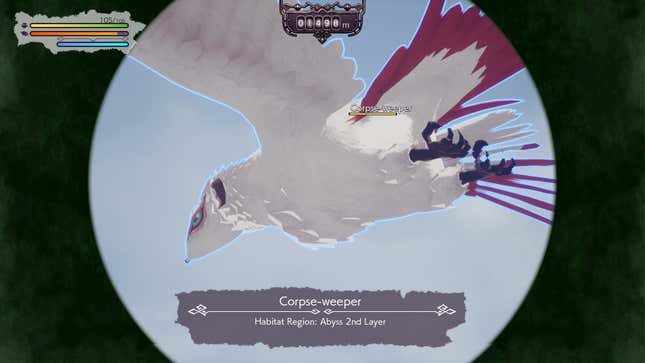
On paper, Binary Star Falling into Darkness has all the workings of a great game. Fully-voiced English dubs in which the original anime actors reprise their roles are a rarity in anime-adapted video games, and the game’s attempts to replicate the lore of the show within its gameplay mechanics are ambitious. However, those same mechanics make for an aggravating gameplay experience.
The only parts of the game I enjoyed were when it followed the basic tenets of explorative RPGs. For example, the game has health, stamina, and hunger gauges. The longer you explore, the more your hunger gauge depletes. If you’re scaling the side of a mountain, your stamina gauge will deplete as well. By foraging plants and murking the abyss wildlife, you can craft food that refills any of the three bars. Turning creatures into trail mix and mining as you go fills your backpack with items you can use to craft better healing items and tools, respectively, and which can over encumber you if you’re not careful. While these are rudimentary survival mechanics, it was pleasant enough balancing my party’s health, hunger, and stamina while gathering ancient artifacts and life-saving food.
When the game attempts to evoke the feel of the anime, it starts to come apart.
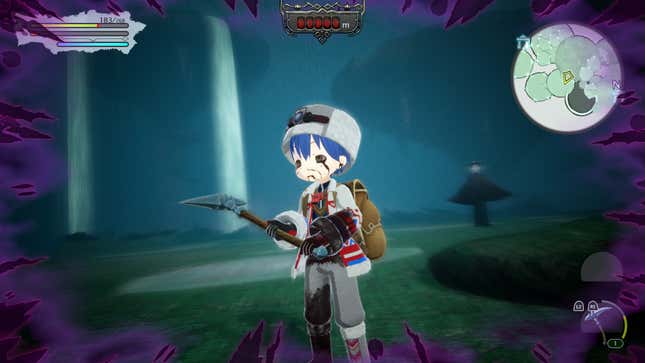
The Curse of the Abyss, which basically works like a deep-sea diver’s equilibrium going haywire if they surface too quickly, is implemented into the game in an annoying fashion. If you increase your altitude too drastically by climbing up a cliffside, your character will lose their senses, which can be fatal. However in the game, simply walking up a slight incline will have your screen throbbing with purple, ink-like distortions. This always brought the game to a screeching halt; if I were walking up a hill I’d have to pause until the purple warning signs faded, then continue ascending until inevitably met with the Curse of the Abyss yet again.
The game’s real-time combat is rote, perfunctory, and boring. Crossing the path of any creature within the abyss always leads to a fight that Reg can swiftly end with two good swings from his pickaxe. If it’s a giant-ass bird, chances are you’re going to have to give it three or four more swings. Aside from delivering a steady flow of crafting ingredients, combat is mostly just a waste of your time.
At one point, I glitched out the game by having Reg grapple hook me up a mountain. Instead of getting a game over for ignoring the Curse, Riko fell down the cliff safely. However, she was still in the fetal position and Reg’s model had disappeared entirely. I’d chalk it up to the Curse of the Abyss but that’s just a good old-fashioned bug that led me to reload my entire save of that level
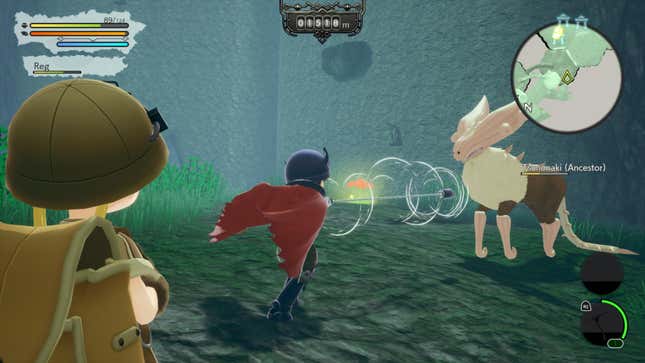
When the exploration wasn’t grinding me down, its vocal performances were. Vocal performances in Binary Star Falling into Darkness range from adequate to excessive, especially in Riko’s case. As with Xenoblade Chronicles 3’s repetitive dialogue, Binary Star Falling into Darkness also suffers from having too few voice lines, and poorly deploying the ones it does have.
If you walk by harvestable flora or aggressive animals, Reg will without fail blurt out that he senses something. If Riko needs to climb something, she’ll make the exact same tiny grunt while doing so. If you so much as get hit a couple of times by an enemy but don’t think it warrants using your health items, Reg will nag you about not looking too good until you cave and nosh on something. Even documenting creatures in your notebook by scanning them with your binoculars is quickly compromised by Reg. Before you can even get to the halfway point scanning a venus fly trap, Reg’s aggro-ass AI will pummel it into dust, making your expedition all the more irksome. Instead of immersing me in their journey, whenever characters opened their mouths to spout the same repetitive drivel, it took me right out of it.
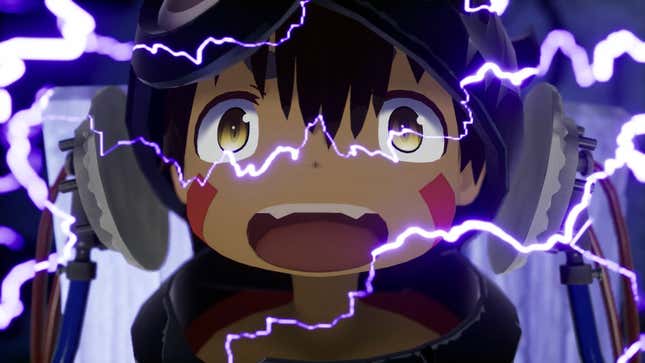
The visual novel bits are awkward to sit through, too. While the voice actors are doing a great job of emoting the same as they did in the anime, the 3D models do a piss-poor job of matching up with their vocal inflections. For example, in scenes where Riko reminisces about her probably-dead mother to Reg, her 3D model soullessly pantomimes about like a Chuck E. Cheese animatronic.
Considering the game’s developer cut its teeth making the 2021 visual novel for Re:Zero (deep breath) Re:ZERO -Starting Life in Another World- The Prophecy of the Throne, I couldn’t help but wish it restricted the 3D models to exploration scenes and just threw a couple of appropriate character-art PNGs onto the screen during visual novel segments. Hell, it could have even jostled them about like they were taped to a piece of plywood and it would have looked less awkward than watching the 3D models stiffly pantomime.
Made in Abyss: Binary Star Falling into Darkness is by no means a replacement for watching its anime—which has just entered its second season this summer—and scarcely manages to deliver the immersive gameplay experience it’s marketed as being. If anything, it plays like a hastily thrown-together blockbuster movie tie-in that leaves all the heart and soul of its source material by the wayside.